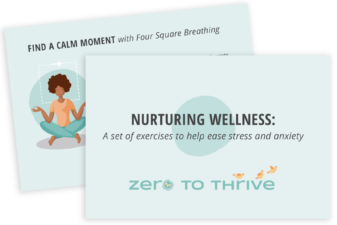Parents' and Caregivers' Guide to Coping with the Coronavirus (COVID-19) Crisis
These are hard times. During this coronavirus outbreak many parents are feeling stressed or worried about lots of things, from staying healthy, keeping the family well, paying bills, caring for children who are homebound, keeping kids on task with school assignments, and the list goes on. These kinds of worries can feel overwhelming and cause strong emotions, so if you are feeling that way know that you are not alone. We will get through all of this and can make it a little easier by taking good care of ourselves.

Nurturing Wellness Exercises
During this stressful, rapidly changing time, it may feel like many things are out of our control. In moments like this, it is helpful to take a step back, and consider the parts of our lives where we can make choices, and can take positive action. We can feel more peaceful (and less worried!) when we recognize how we play an active role in helping ourselves, our families, and our communities.
Focus on the little things
Inch by inch things are a cinch, yard by yard, things are hard. What are the “inch by inch” (little) things you can focus on, so you don’t get lost in the big things that might feel too overwhelming? Some ideas for “small actions” are listed below that might help you feel more calm inside.
Nurturing and “Refueling” ourselves
Caring for ourselves helps us to be ready and able to care for and nurture our children and those we love. Here are some suggestions that might help during this difficult time:
- Reassure: Remind yourself that your feelings are ok and understandable, and of the positive things you can do for yourself to get through this hard time.
- Routines: Keep a regular daily schedule with time for your daily “must dos,” and exercise and rest.
- Regulate: To manage stress, actively engage in strategies that will help you calm. For example, practice deep breathing; take a walk; draw your feelings; listen to a favorite song; reach out to a friend; close your eyes and imagine sunshine filling you with warmth.
Find your sense of purpose. Look for opportunities to “do good” - for example leaving groceries on doorsteps of neighbors who can’t get out, or calling or video-chatting with someone who cannot have visitors at present. Thank people in your community who are working to help others or who have helped you or put a note in a neighbor’s door. Finding ways to “do something” helps move “from worry to wellness” by feeling more purposeful and helpful. This can help strengthen you, and our sense of community action and connectedness.
Find your center in the midst of the storm
Find a way to connect with the center of your deepest self to re-awaken your sense of J.O.Y.:
J: Just taking a moment.
When things feel overwhelming, take a moment to be still. Take the time to notice your feelings, pause and reflect. Even just three slow deep breaths can bring a moment of calm into your day.
O: Observe the lights.
Find the “light” in the midst of the “shadows.” What are the small things for which you are grateful? The taste of your morning coffee, the warm shower you had, the phone call you received from a friend… Remember how you felt when you experienced someone’s care and kindness.
Y: You can be the light.
Remind yourself that you can be a source of light and kindness for others in the world. At a time when so much is out of our control, you can focus on the moments when you have made a difference—for your child, family or community. Reminding yourself of the ways you have helped others and spread kindness can help you feel more connected, and more peaceful.
These are unprecedented times. But these times also create tremendous opportunities for us to practice our values- to care for others, connect with those we love, to find community and purpose wherever we can. This reminds us all of how connected we are to one another—and ultimately, we get through this together.
Stay emotionally connected!
Experts are recommending that we keep space between people – at least 6 feet. This is called social distancing and is an important way to reduce the spread of the coronavirus. However, keeping physical space between people does not mean emotional distancing! In fact, staying connected to friends and family will reduce your stress. Call a loved one or check in with your neighbor while maintaining at least 6-feet of space between you and them. It can be calming to simply think about the people you care about and draw on the strength of those connections. So stay back, but keep your heart close.
Understanding the facts about COVID-19 and being prepared can make an outbreak less stressful.
Resources
Resources for parents to and caregivers to cope with the COVID-19 pandemic:
Additional COVID-19 information and resources:
